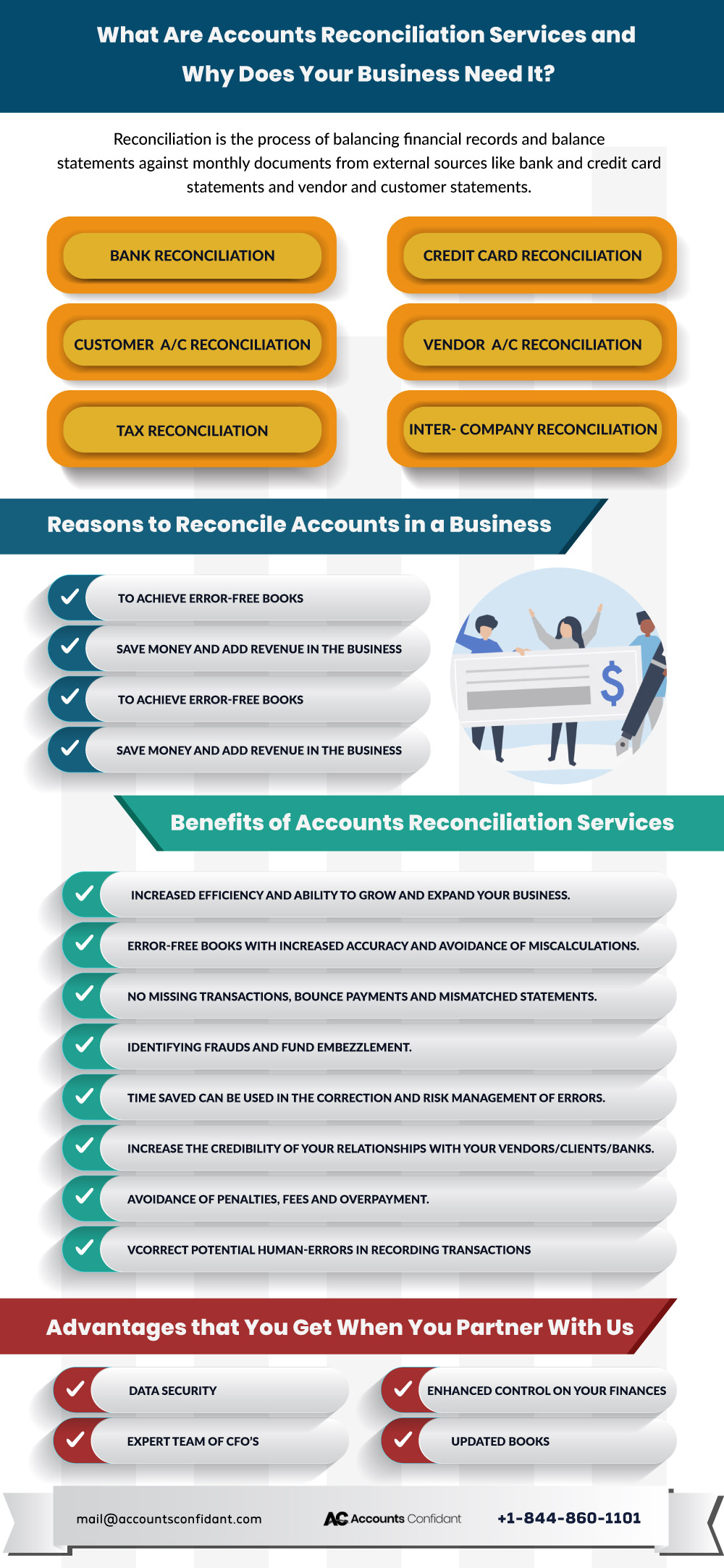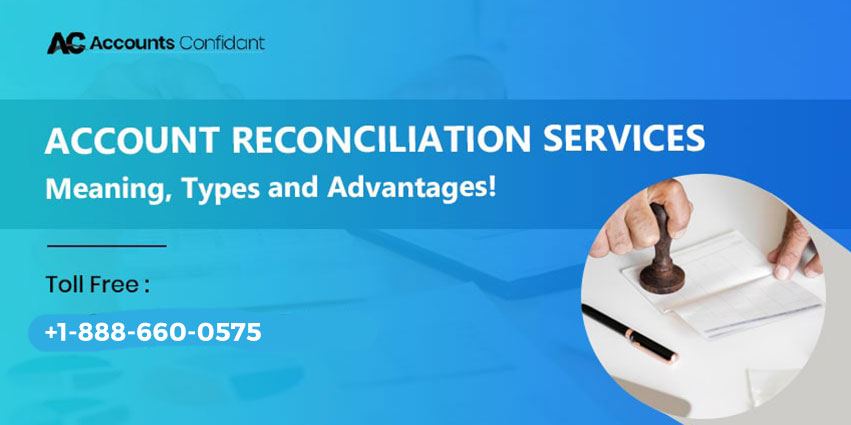Reconciliation is a fundamental accounting process of matching and balancing two sets of records. This would mean that the money leaving the account is matching the money spent. This is done by reconciling at the end of a particular accounting period by reviewing documents and analytics. This helps individuals and businesses to prove that every transaction sums to the accurate ending account balance. No matter the size and stage of a business account reconciliation are quintessential for them all.
There are a different type of Reconciliation Services-
In this blog, we will talk about each of these types of reconciliations and the corresponding benefits of them all.
- Bank Reconciliation
- Credit Card Reconciliation
- Customer Account Reconciliation
- Vendor Account Reconciliation
- Tax Reconciliation
- Inter-Company Reconciliation

1. Bank Reconciliation Services:
What it means: Every bank takes out a collection of documents that record all the transactions that your business has made through the bank; we call these bank statements. The business receives the same statements as cash balances. Bank account reconciliation happens when the cash balances and the bank statements are balanced and matched at the end of every month.
Ideal Timeline: Ideally the bank reconciliation activities should be completed on a monthly basis.
Advantages:
There are various benefits of bank reconciliation. They not only help your statements be error-free but also aids in catching any fraudulent transactions. Here are some of the benefits of bank reconciliation.
Identify Faults In Your Books:
Firstly, bank account reconciliation helps track any potential accounting errors. By matching and balancing your statements, you also end up keeping your books under check.
Prevent Potential Overdraft:
If you are running a business, then it is a well-known fact that there is a lag time between cash flows. Be it to vendors and employees or in payments coming in from clients and customers. In such cases of low cash reserves, regular bank reconciliation can help to manage these postponed payments. These can prevent company overdrafts, bounced checks and insufficient fund fees and interests as you are always aware of the cash flow status.
Keep a Check on Banking Error:
Human error remains a potential possibility and therefore there is always a requirement to keep it under check. Recording of an incorrect amount, omitting an amount out of the bank statement or recording a duplicate transaction. It is only when you reconcile your bank accounts on a regular basis that you can notify the bank of these errors and get them corrected right away.
Enhance Your Collection Actions:
Every business takes managing its accounts receivables to be an essential task. When a customer’s payment clears the bank, the receivables are no longer taken to be outstanding and therefore need to further action. Regular bank reconciliation helps businesses assess whether there is a need or the degree of action that needs to be taken in the collection of accounts receivables.
2. Credit Card Reconciliation:
What it Means: Taking the credit card statements of your business on their face value is not advised. It is important to reconcile your credit card statements by verifying whether you actually made the purchases that you are being charged for. This involves balancing and matching your credit card statements with your current receipts. More than reconciling all your company’s transactions for the month, it also includes the total fees charged to your account.
Ideal Timeline: Your credit card reconciliation should take place on a monthly basis.
Advantages:
- You are able to successfully identify lost checks, deposits, and unauthorized wire transactions.
- In case the bank has levied unjustified or excess bank charges, they can be identified promptly and corrected at the right time.
- In the event of potential embezzlement of funds from your company, you can clamp down on the parties involved and begin the process of collection.
3. Customer Account Reconciliation:
What It Means: Customer Reconciliation is the process by which a bookkeeper compares the outstanding customer balances with the accounts receivables in the general ledger.
Ideal Timeline: The ideal scheduling for the customer reconciliation services every month’s end as a part of the accounts closing activities before the issuance of the monthly financial statements.
Advantages:
- With regular customer reconciliation, you can eliminate the possibility of error in the business’ receivables records.
- It also prevents material errors in the financial statements of the firm that business’ draft at the end of every month.
- Your business is able to avoid bounce payments and missed transactions which eventually helps your enterprise save revenue.
- Regular accounts receivable services are able to facilitate as an internal auditor while auditing accounting records.
4. Vendor Account Reconciliation:
What It Means: Vendor reconciliation is also known as supplier statement reconciliation. It means balancing the business’ payables to the vendor’s account balance and to the vendor’s outstanding balancing.
Ideal Timeline: The ideal timeline to undertake vendor reconciliation is before closing the accounts at the end of every month so that the statements are correct.
Advantages:
- To Avoid The Disruption of Future Supplies: Any lag or discrepancy in your statements in comparison to your vendor’s outstanding balance can lead to a disruption in the future supply for your business. In cases where there are missing invoices, upon regular reconciliation, you can request the vendor to resend the documents with proof of delivery. This can lead to the smooth functioning of your business and vendor supply.
- Prevent Paying The Wrong Vendor: If you do not carry out regular vendor reconciliation, you can capture the wrong invoice for the wrong vendor and end up paying the wrong vendor. This also helps in the case of duplicate invoices. Accurate and scheduled vendor reconciliation services can aid in identifying duplicate payments.
- Identify Missed Payments From Your Vendor: Vendor reconciliation can also help identify the payments that were made on your end but have not yet been allocated or received from your vendor. This reduces the total outstanding payment and maximizes the cash flow.
- Helps in avoiding over-payment: If the vendor’s pricing in the master data is incorrect or has captured an incorrect price, then regular vendor reconciliation can aid in the prevention of an overpayment. It also includes the omission of discounts.
- Litmus Test of Vendor Relationship: This perhaps is the most important part of the advantages that come with vendor reconciliation. When your payables match with the vendor’s outstanding and current payables then you are able to establish a relationship of confident trade and integrity. An unbalanced reconciliation if unattended to can lead to embarrassment.
How To Always Stay Ahead With Your Accounts Reconciliation?
- Define a standard operation: When it comes to reconciliation processes, it is important to identify and follow a strategy to carry out the process. This process should stay uniform for all the parties involved. This involves the policy, process, and templates for all kinds of reconciliation, be it the bank, credit card, customer or vendor.
- Use Experts: Reconciliation involves the principles and understanding of all the intricacies of bookkeeping. Therefore, it is important to get in touch with an expert at reconciliation services. This not only helps you get efficient and error-free services but also the validity of scheduled and regular reconciliation.
- Maintain a Checklist: A business involves dynamic transactions. Therefore maintaining the checklist is integral.
- Outsource Reconciliation: Maintaining the books and keeping them error-free is a tedious task and requires expertise. Reconciliation, however additionally requires a completely error-free process, as a basis this, the authenticity of other bookkeeping tasks matter. So the best practice, in this case, is to outsource these reconciliation services. These experts will help you get the records and statements balanced and matched.
Are you willing to make the change? Our team at Accounts Confidant are experts at streamlining your reconciliation so that you are able to get ahead with your operations and eventually grow. For reconciliation related queries or for general bookkeeping needs, you can call us on +1-877-519-7362.








